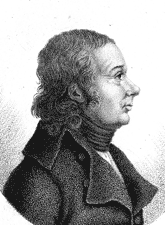
Lorenzo Mascheroni (Italian pronunciation: [loˈrɛntso maskeˈroːni]; May 13, 1750 – July 14, 1800) was an Italian mathematician.
Biography
He was born near Bergamo, Lombardy. At first mainly interested in the humanities (poetry and Greek language), he eventually became professor of mathematics at Pavia.

In his Geometria del Compasso (Pavia, 1797), he proved that any geometrical construction which can be done with compass and straightedge, can also be done with compasses alone. However, the priority for this result (now known as the Mohr–Mascheroni theorem) belongs to the Dane Georg Mohr, who had previously published a proof in 1672 in an obscure book, Euclides Danicus.
In his Adnotationes ad calculum integralem Euleri (1790) he published a calculation of what is now known as the Euler–Mascheroni constant, usually denoted as γ (gamma).
He died in Paris.
Works
- Nuove ricerche sull'equilibrio delle volte (in Italian). Milano: Giovanni Silvestri. 1829. Bibcode:1829nrse.book.....M.
External links
- O'Connor, John J.; Robertson, Edmund F., "Lorenzo Mascheroni", MacTutor History of Mathematics Archive, University of St Andrews